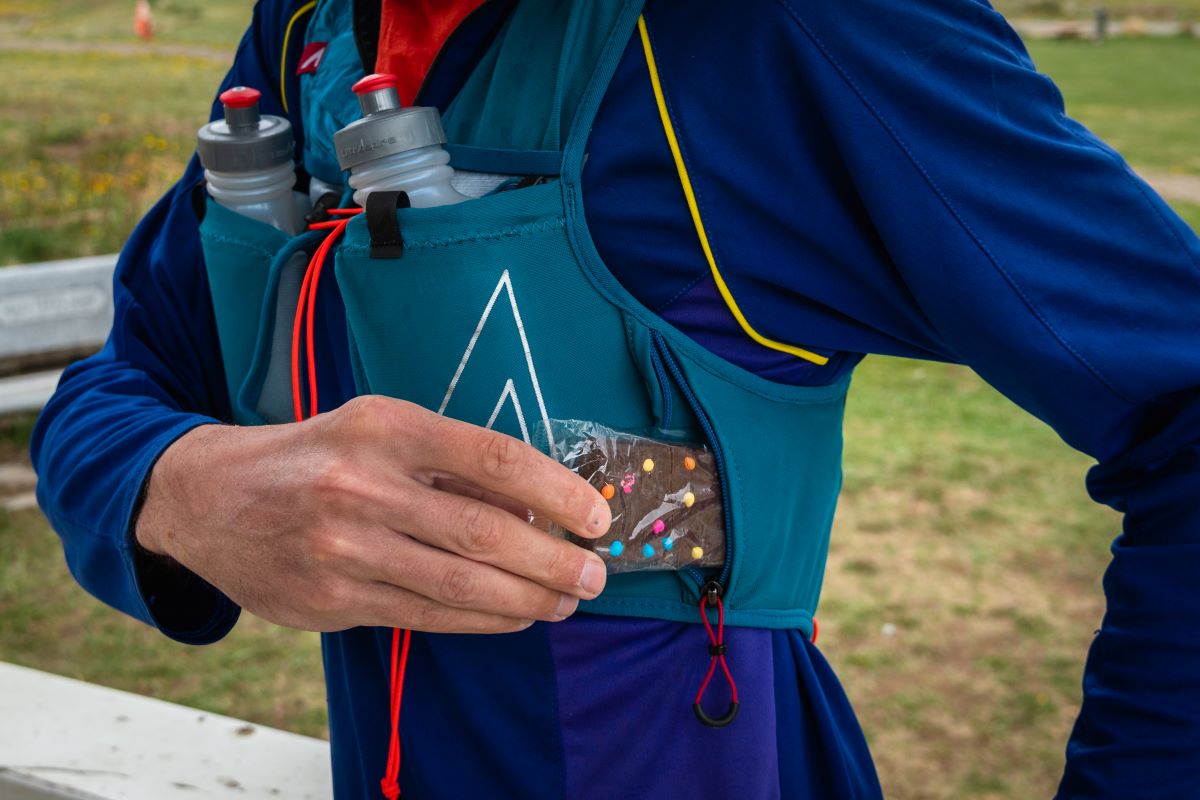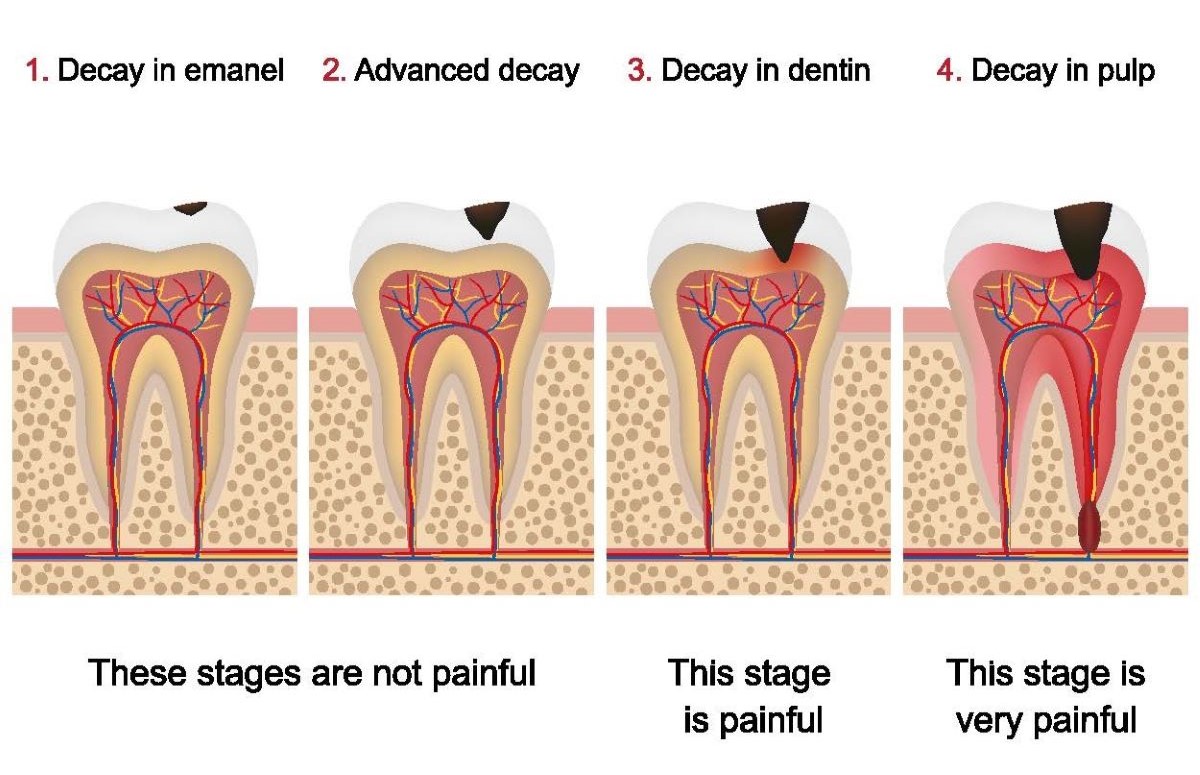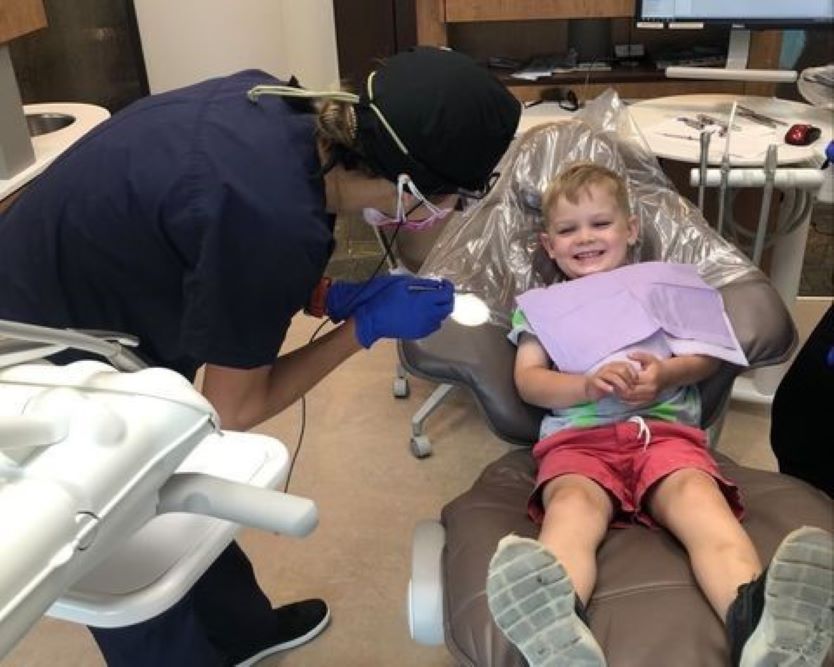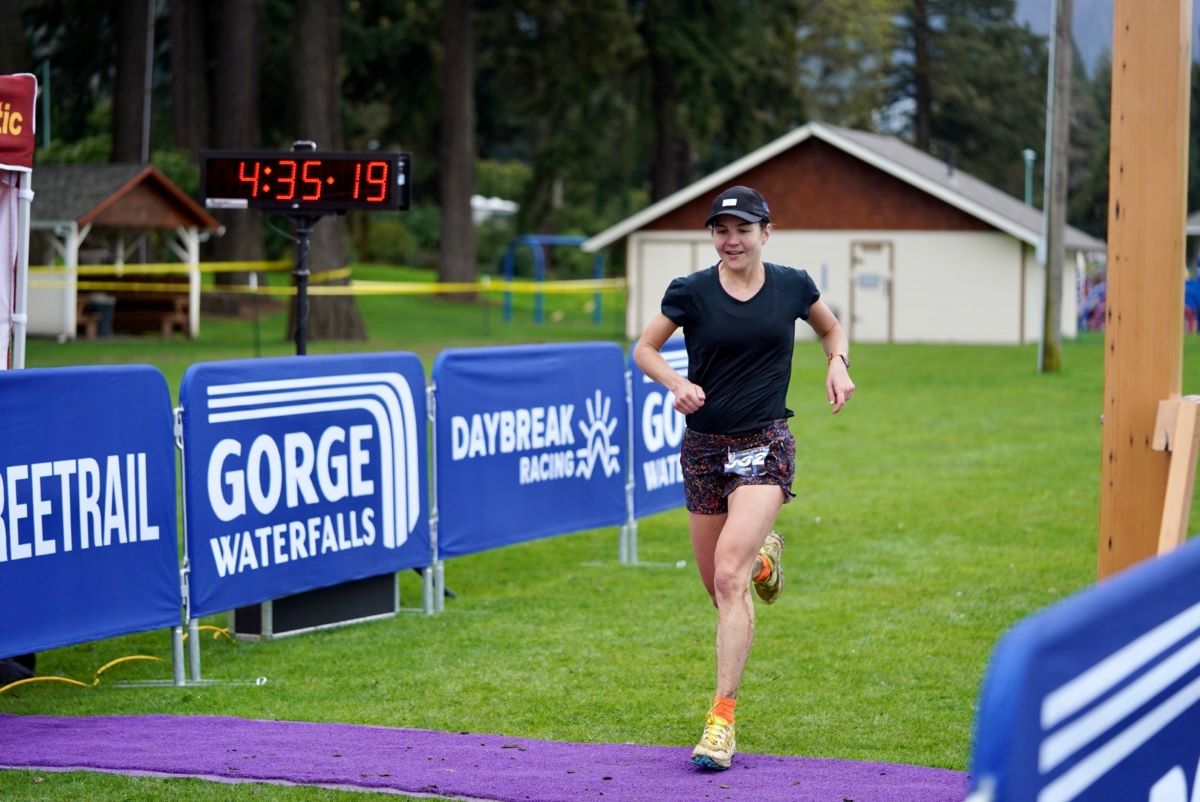Did my recent root canal prompt this article? Possibly. Has this topic been on my mind with each sip of sugary sports drink and every bite of gummy candy ingested during my ultrarunning career? Most definitely. The “sugary drinks cause cavities” talk has been a common narrative between endurance athletes and their dentists for a long time — and one that until recently seemed backed by science (4).
So, what does the science currently say and what do endurance athletes actually need to worry about when it comes to their oral health?

The things that fuel our adventures in the mountains can also fuel tooth erosion. Photo: iRunFar/Eszter Horanyi
Why Is Oral Health Important?
When we think of oral health, it’s likely we think solely about dental caries (cavities), but oral health goes well beyond tooth decay. When oral health is poor, bacteria not only work away at the enamel (outside) and pulp (inside) of your teeth, but it can also cause inflammation of your gums, leading to gum disease (periodontitis). More critically, it can lead to other systemic conditions, or diseases that go far beyond your mouth. These conditions and diseases include endocarditis (infection and inflammation of the inner lining of your heart), cardiovascular disease, and pneumonia. Essentially, good oral health is good for your overall health and well-being.
While that should be enough to get us all rushing off to floss and brush our teeth, poor oral health has also been linked to poor athletic performance! Some of this impact is likely due to pain and systemic inflammation associated with tooth decay and/or gum disease (2). And it’s common; 30% of all medical emergencies treated at the 2012 Olympic Games were induced by oral diseases (6). On the flip side, other studies show good oral health to be correlated with better performances and results in ultra-endurance races more broadly (5).

Tooth decay can start small, slowly eating into your enamel. Gradually over time, without proper treatment by your dentist, it can progress through your enamel, into your dentin (bony tissue), and eventually into the pulp of your tooth, which can kill the nerve in your tooth and ultimately create an abscess (pocket of infection). Photo: Shutterstock
How Are Endurance Sports Hard on Our Teeth?
So, what is it about endurance training and racing specifically that has given us a bad reputation with dentists? Endurance training and racing create a perfect storm for potential cavity creation. The major hit list includes the following:
- Frequent carbohydrate beverages and snacks feed our bacteria.
- Breathing hard for a long time as we do while running both reduces the amount of saliva we produce and the composition of that saliva, reducing its protective properties (and making our mouth more acidic).
- Other acidic things include ultra-racing favorites: vomiting and gastroesophageal reflux.
- Stress creates a higher likelihood of clenching and/or grinding our teeth (1,3).
These things separately and, even worse, in combination, are a recipe for tooth decay and poor oral health. But do endurance athletes have a higher incidence of dental issues?
Based on the most recent studies conducted on German and French athletes, it seems like we are about average and not that different from our more recreational peers. The link? While consuming ‘worse’ diets than our peers, we are as likely, perhaps even more likely, to comply with the recommended daily and biannual dental care of brushing, flossing, and seeing our dentists. What this says to me is that while we are regularly creating a perfect storm for oral chaos, we can counter it effectively with appropriate dental care.
How Can You Make Your Dentist Proud?
Funnily enough, this is a question I have asked myself on more than one occasion, and so for this article, I thought, who better to ask than an actual dentist! Enter professional trail runner and ultrarunner Arden Young, who, when she is not running and racing all over the world, is a dentist in Calgary, Alberta. What follows is that interview, full of advice and knowledge on how to impress your dentist.
iRunFar: Ultrarunning training and racing seem like the perfect storm for poor oral health. Is it as bad as it seems?
Arden Young: It can be, but the damage is preventable! As an athlete, you go to your massage therapist, your physiotherapist, and your dietician. But do you go to your dentist? Physical health and fitness allow our bodies to perform incredible feats of endurance in the mountains, but where does oral health play into all of this? The mouth, after all, is connected to the rest of the body. And when I think about all of the fuel that went into running my last ultra — the gummies, gels, sports drinks, and candy — it sounds like a lot of the things I tell my patients not to consume. Running helps keep us healthy, mentally and physically, so what could possibly go wrong with the ultrarunning-oral health combo?
iRunFar: What should I be most concerned about as an ultrarunner?
Young: [laughs] Let me count them. High frequency and amount of carbohydrate consumption, over extended periods of time, creates a buffet for bad oral bacteria. We are talking the sports drinks, gummies, gels, candy, and cookies — the fuel your body needs to do these hard things, also fuels the cavity-creators. Bacteria, like Streptococcus mutans, will eat these sugars and produce acid as a waste product, which erodes the teeth’s protective layer of enamel and eventually can create a cavity. Sticky foods, plus the high frequency of consumption, create a prolonged acid attack.
Saliva normally sits at a pH of 6.2 to 7.6, but when we add in the acid produced by bacteria, acidic food and drinks, and some of the glamour of ultrarunning — vomiting and acid reflux — that pH drops. Our saliva thus becomes more acidic.
When the pH of saliva drops below 5.5, tooth enamel starts to break down. Enamel cannot grow back, so this damage is permanent. Acid erosion will increase sensitivity to hot, cold, and sweet, as well as make you more prone to developing cavities. In addition, mouth-breathing and dehydration reduce the amount of saliva available to wash away food particles and neutralize acid.
Finally, clenching and grinding — at times of high stress, pain, and focus, we often clench our jaws or grind our teeth. A lot of tension is held in the facial muscles, sometimes without our awareness. This can damage existing fillings or even chip teeth. On that note, try to avoid the really stale or hard gummies that might pull off a crown or break a filling.
So, my summary answer to, “Why is it so bad?” It’s a combination of long duration and high frequency of sticky sugars, acidic oral environment, and stress.
iRunFar: Should I brush my teeth during a 100-mile race or after a long run?
Young: One thing that really helps is rinsing with plain water after each sugar consumption. This will help wash away the particles and neutralize the acidic pH. Another good option is to chew sugar-free or xylitol gum because it will stimulate salivation, and xylitol is bacteriostatic to Streptococcus mutans. This means it will actually change the quality of your oral bacteria with prolonged use.
Brushing your teeth during an ultra or after a long run is great because it removes plaque (i.e., the biofilm of bacteria and food that sticks to the teeth and sets up a cavity factory) and gives you a dose of fluoride that helps prevent cavities. However, try not to brush your teeth immediately after eating something acidic, as it can actually cause more enamel wear, because you’re brushing it in the demineralized state. It’s better if you can rinse with water, and wait for an hour for the pH to neutralize.
iRunFar: If you could offer a few pieces of advice to the trail runners and ultrarunners reading this, to combat any athletics-specific dental woes, what would they be?
Young: A few other things you can do to help combat ultrarunning-exacerbated dental issues:
- Rinse your mouth with plain water after eating.
- Stay hydrated.
- Maintain good daily oral hygiene. Brush at least twice a day, floss your teeth, use a fluoridated toothpaste, see your dentist for yearly checkups, and get your teeth cleaned by a dental hygienist at least twice per year.
- Enjoy a healthy diet with plenty of non-sugary hydration when you’re not training or racing.
- Get a night guard to wear, especially during high stress or after big efforts, to help reduce wear on your teeth, facial muscles, and jaw joints.
- If you find you’re one of those cavity-prone people, add a high fluoride toothpaste (for example, PreviDent 5000) into your daily brushing routine. This will create more fluorapatite in your tooth structure and increase its resistance to demineralization.
iRunFar: Okay, so how can I impress my dentist?
Young: Floss! For real, I love people that regularly floss. You will love it too, trust me. And get an electric toothbrush. I personally love the Philips Sonicare. It truly will make a difference to your gum health. Embrace toothpaste with fluoride. I love natural, organic products, but there is a reason why the Centers for Disease Control and Prevention named community water fluoridation one of the 10 great public health achievements of the 20th century. It works. And get your regular, preventative dental checkups and cleanings.

Arden Young at work with her nephew, who has mastered the art of impressing his dentist! Photo courtesy of Arden Young.
Takeaway Tips
Brush and Floss
You heard the dentist! Brush and floss. It doesn’t have to happen during your race. In fact, you shouldn’t brush if your mouth is too acidic, but twice a day and an hour after ingesting sugary food and drink. This not only protects your teeth but also protects your gum health as well.
Swish, Swish, Swish
That’s right, one of the best ways on the run to combat the sugary cocktails we are known to ingest is to simply rinse with water. I know water can be a precious commodity during a long, hot race, but don’t worry you won’t waste any here. You do have to swish, but you don’t have to spit! You can swish first with your drinking water. Periodically rinsing your mouth with normal water can help to wash away particles and neutralize the pH of your mouth, staving off a corrosive environment.
Consider Fluorinated Toothpaste
This is true particularly if you are cavity prone. Brushing with a fluoride toothpaste is protective to the structure of your teeth and increases their resistance to enamel erosion.
Visit Your Dentist
I know, they are scary, they are inconvenient, and they can be expensive. But outside of doing the basics, routine cleanings and visits to your dentist are one of the best ways to avoid situations like the root canal I had to have the week of this year’s Western States 100.
Call for Comments
- Do you take your toothbrush with you on a long ultra?!
- What other practices do you have for taking care of your oral health as a runner?
References
- Coudert, S., Jacq, R., & Bas, A.-C. (2022). The evaluation of oral and Dental Health and behavioural risk among ultra-endurance athletes: A cross-sectional epidemiological study.Research in Sports Medicine, 1–9. https://doi.org/10.1080/15438627.2022.2042296
- Frese, C., Wohlrab, T., Sheng, L., Kieser, M., Krisam, J., Frese, F., & Wolff, D. (2018). Clinical management and prevention of dental caries in athletes: A four-year randomized controlled clinical trial.Scientific Reports, 8(1). https://doi.org/10.1038/s41598-018-34777-x
- Merle CL, Richter L, Challakh N, Haak R, Schmalz G, Needleman I, Wolfarth B, Ziebolz D, Wüstenfeld J. Orofacial conditions and oral health behavior of young athletes: A comparison of amateur and competitive sports. Scand J Med Sci Sports. 2022 May;32(5):903-912. doi: 10.1111/sms.14143. Epub 2022 Mar 7. PMID: 35174553.
- Gallagher, J., Ashley, P., Petrie, A. et al.Oral health-related behaviours reported by elite and professional athletes. Br Dent J 227, 276–280 (2019). https://doi.org/10.1038/s41415-019-0617-8
- Belinchón-deMiguel P, Ruisoto P, Knechtle B, Nikolaidis PT, Herrera-Tapias B, Clemente-Suárez VJ. Predictors of Athlete’s Performance in Ultra-Endurance Mountain Races. International Journal of Environmental Research and Public Health. 2021; 18(3):956. https://doi.org/10.3390/ijerph18030956
- De la Parte, A., Monticelli, F., Toro-Román, V., & Pradas, F. (2021). Differences in oral health status in elite athletes according to sport modalities. Sustainability, 13(13), 7282. https://doi.org/10.3390/su13137282


